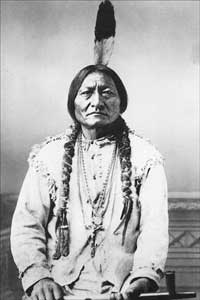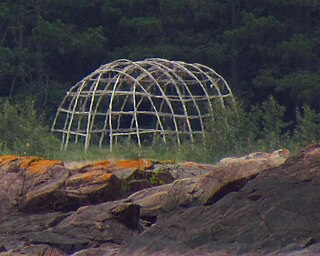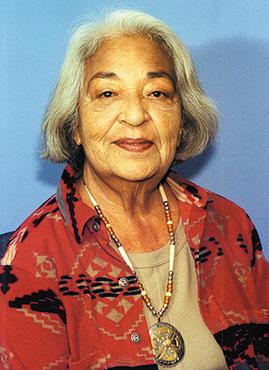Related Research Articles

The Lakota are a Native American people. Also known as the Teton Sioux, they are one of the three prominent subcultures of the Sioux people, with the Eastern Dakota (Santee) and Western Dakota (Wičhíyena). Their current lands are in North and South Dakota. They speak Lakȟótiyapi—the Lakota language, the westernmost of three closely related languages that belong to the Siouan language family.

A sweat lodge is a low profile hut, typically dome-shaped or oblong, and made with natural materials. The structure is the lodge, and the ceremony performed within the structure may be called by some cultures a purification ceremony or simply a sweat.

A tipi or tepee is a conical lodge tent that is distinguished from other conical tents by the smoke flaps at the top of the structure, and historically made of animal hides or pelts or, in more recent generations, of canvas stretched on a framework of wooden poles. The loanword came into English usage from the Dakota language and Lakota language.

Lakota, also referred to as Lakhota, Teton or Teton Sioux, is a Siouan language spoken by the Lakota people of the Sioux tribes. Lakota is mutually intelligible with the two dialects of the Dakota language, especially Western Dakota, and is one of the three major varieties of the Sioux language.

Wasi'chu is a loanword from the Sioux language which means a non-Indigenous person, particularly a white person, often with a disparaging meaning.
Sioux is a Siouan language spoken by over 30,000 Sioux in the United States and Canada, making it the fifth most spoken Indigenous language in the United States or Canada, behind Navajo, Cree, Inuit languages, and Ojibwe.
Nakota is the endonym used by those Native peoples of North America who usually go by the name of Assiniboine, in the United States, and of Stoney, in Canada.
Chanunpa is the Lakota language name for the sacred, ceremonial pipe and the ceremony in which it is used. The pipe ceremony is one of the Seven Sacred Rites of the Lakota people. Lakota tradition has it that White Buffalo Calf Woman brought the chanunpa to the people, as one of the Seven Sacred Rites, to serve as a sacred bridge between this world and Wakan Tanka, the "Great Mystery".

Kevin Edward Locke was of Lakota descent of the Standing Rock Sioux Tribe and Anishinaabe of White Earth. He was a preeminent player of the Native American flute, a traditional storyteller, cultural ambassador, recording artist and educator. He was best-known for his hoop dance, The Hoop of Life.

The Oglala are one of the seven subtribes of the Lakota people who, along with the Dakota, make up the Očhéthi Šakówiŋ. A majority of the Oglala live on the Pine Ridge Indian Reservation in South Dakota, the eighth-largest Native American reservation in the United States.

Michael Spears is an Indigenous American actor. He is a member of the Kul Wičaša Lakota from the Lower Brulé Sioux Tribe of South Dakota.

The "AIM Song" is the name given to a Native American intertribal song. Although the song originally did not have a name, it gained its current alias through association with the American Indian Movement. During the takeover of Wounded Knee, it was used as the anthem of the "Independent Oglala Nation."

Edward Spears is an Indigenous American actor. He is a member of the Kul Wičaša Oyate Lakota from the Lower Brulé Sioux Tribe of South Dakota.
Pekka Johannes Hämäläinen is a Finnish historian who has been the Rhodes Professor of American History at the University of Oxford since 2012. He was formerly in the history department at University of California, Santa Barbara.

Two-spirit is a contemporary pan-Indian umbrella term used by some Indigenous North Americans to describe Native people who fulfill a traditional third-gender social role in their communities.
Maverick Junction, South Dakota, United States, is an unincorporated community and census-designated place (CDP) located in Fall River County at the intersection of South Dakota Highway 79 and US Highways 18 and 385, approximately five miles southeast of Hot Springs. The population was 46 at the 2020 census.
Eugene Buechel was born on October 20, 1874, in Schleida, now Schleid, in the Grand Duchy of Saxe-Weimar-Eisenach, Germany, and died October 27, 1954, in O'Neill, Nebraska, United States. Buechel was a Jesuit priest and missionary, linguist and anthropologist among the Brulé or Sicangu Lakota or Sioux on the Rosebud Indian Reservation and the related Oglala Lakota or Sioux on the Pine Ridge Indian Reservation in South Dakota.

Patricia A. Locke was a Native American educator, activist, and prominent member of the Baháʼí Faith. She worked closely with indigenous activists in supporting the American Indian Religious Freedom Act. After joining the Baháʼí Faith in 1988, she was elected as the first Native American woman to serve on the National Spiritual Assembly of the Baháʼís of the United States.